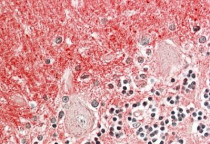ARG58907
anti-GNB3 + GNB4 antibody
anti-GNB3 + GNB4 antibody for IHC-Formalin-fixed paraffin-embedded sections,Western blot and Human
Overview
| Product Description | Goat Polyclonal antibody recognizes GNB3 + GNB4 |
|---|---|
| Tested Reactivity | Hu |
| Tested Application | IHC-P, WB |
| Specificity | This antibody is expected to recognize GNB3 & GNB4 (GeneID: 2784, 59345; ProteinID: NP_002066.1; NP_067642.1). |
| Host | Goat |
| Clonality | Polyclonal |
| Isotype | IgG |
| Target Name | GNB3 + GNB4 |
| Antigen Species | Human |
| Immunogen | Synthetic peptide from the internal region of Human GNB3 and GNB4. (NP_002066.1, NP_067642.1) (SGHDNRVSCLGVT) |
| Conjugation | Un-conjugated |
| Alternate Names | Guanine nucleotide-binding protein G(I)/G(S)/G(T) subunit beta-3; Transducin beta chain 3; Guanine nucleotide-binding protein subunit beta-4; Transducin beta chain 4; CMTD1F |
Application Instructions
| Application Suggestion |
|
||||||
|---|---|---|---|---|---|---|---|
| Application Note | IHC-P: Antigen Retrieval: Steam tissue section in Citrate buffer (pH 6.0). WB: Recommend incubate at RT for 1h. * The dilutions indicate recommended starting dilutions and the optimal dilutions or concentrations should be determined by the scientist. |
||||||
| Observed Size | ~ 35 kDa |
Properties
| Form | Liquid |
|---|---|
| Purification | Ammonium sulphate precipitation followed by affinity purification with immunogen. |
| Buffer | Tris saline (pH 7.3), 0.02% Sodium azide and 0.5% BSA. |
| Preservative | 0.02% Sodium azide |
| Stabilizer | 0.5% BSA |
| Concentration | 0.5 mg/ml |
| Storage Instruction | For continuous use, store undiluted antibody at 2-8°C for up to a week. For long-term storage, aliquot and store at -20°C or below. Storage in frost free freezers is not recommended. Avoid repeated freeze/thaw cycles. Suggest spin the vial prior to opening. The antibody solution should be gently mixed before use. |
| Note | For laboratory research only, not for drug, diagnostic or other use. |
Bioinformation
| Database Links |
Swiss-port # P16520 Human Guanine nucleotide-binding protein G(I)/G(S)/G(T) subunit beta-3 |
|---|---|
| Gene Symbol | GNB3; GNB4 |
| Gene Full Name | guanine nucleotide binding protein (G protein), beta polypeptide 3; guanine nucleotide binding protein (G protein), beta polypeptide 4 |
| Background | Heterotrimeric guanine nucleotide-binding proteins (G proteins), which integrate signals between receptors and effector proteins, are composed of an alpha, a beta, and a gamma subunit. These subunits are encoded by families of related genes. This gene encodes a beta subunit which belongs to the WD repeat G protein beta family. Beta subunits are important regulators of alpha subunits, as well as of certain signal transduction receptors and effectors. A single-nucleotide polymorphism (C825T) in this gene is associated with essential hypertension and obesity. This polymorphism is also associated with the occurrence of the splice variant GNB3-s, which appears to have increased activity. GNB3-s is an example of alternative splicing caused by a nucleotide change outside of the splice donor and acceptor sites. Alternative splicing results in multiple transcript variants. Additional alternatively spliced transcript variants of this gene have been described, but their full-length nature is not known. [provided by RefSeq, Jul 2014] |
| Function | Guanine nucleotide-binding proteins (G proteins) are involved as a modulator or transducer in various transmembrane signaling systems. The beta and gamma chains are required for the GTPase activity, for replacement of GDP by GTP, and for G protein-effector interaction. [UniProt] |
| Calculated MW | 37 kDa |
Images (2) Click the Picture to Zoom In
-
ARG58907 anti-GNB3 + GNB4 antibody IHC-P image
Immunohistochemistry: Paraffin-embedded Human cerebellum stained with ARG58907 anti-GNB3 + GNB4 antibody at 3.8 µg/ml dilution. Antigen Retrieval: Steam tissue section in Citrate buffer (pH 6.0).
-
ARG58907 anti-GNB3 + GNB4 antibody WB image
Western blot: 35 µg of HepG2 cell lysate (in RIPA buffer) stained with ARG58907 anti-GNB3 + GNB4 antibody at 0.1 µg/ml dilution and incubated at RT for 1 hour.







